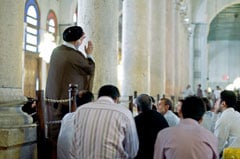- Trending:
- Easter
- |
- Lent
- |
- Forgiveness
- |
- Resurrection
- |
- Joy
- |
- Feminism

RELIGION LIBRARY
Sunni Islam
Leadership
In Sunni Islam, imams are crucial for the performance of rites associated with birth and death, the drawing up of marriage contracts, the performance of communal prayer and weekly sermons, and the day-to-day counseling and leadership of a congregation. Sunni imams generally receive training at religious schools, though the processes vary and there is no single curriculum. In addition, these systems of education are locally shaped, and since Islam does not have a single governing board or leader, there is a great deal of variety in the way in which these scholars are trained. Imams do not practice celibacy, and often have other jobs or roles in the communities they serve.
Leadership within a religious community becomes especially relevant in moments of transition and crisis. Major life changes such as a marriage or the birth of a child call for the consultation or presence of a person familiar with the shariah and who can assure congregants that they conduct their ceremonies in accordance with the Sunna of Muhammad.  Since Sunnis try to emulate the Prophet in daily life, following customary practice for the celebration of major life events such as weddings or funerals is particularly emphasized in Sunni communities. Furthermore, Islamic law is relevant to contractual relationships and commercial relationships affected by marriage, birth, or death. Consulting with a religious scholar or imam ensures that these types of issues - marriage contracts, inheritance distributions, and even commercial partnerships - are drawn up according to Islamic law. This kind of guidance is particularly important to Muslim communities living in majority non-Muslim countries, where people seek to blend observance of their beliefs with the civil codes and social traditions of the countries in which they reside.
Since Sunnis try to emulate the Prophet in daily life, following customary practice for the celebration of major life events such as weddings or funerals is particularly emphasized in Sunni communities. Furthermore, Islamic law is relevant to contractual relationships and commercial relationships affected by marriage, birth, or death. Consulting with a religious scholar or imam ensures that these types of issues - marriage contracts, inheritance distributions, and even commercial partnerships - are drawn up according to Islamic law. This kind of guidance is particularly important to Muslim communities living in majority non-Muslim countries, where people seek to blend observance of their beliefs with the civil codes and social traditions of the countries in which they reside.
Imams also shepherd their communities through the crises and challenges they face, including divorce and death. The application of both Islamic law and the Sunna are important elements of these events and the effect they have on their communities, and imams bring their knowledge and training to bear on these difficult situations. They often consult with individuals seeking advice about marriage, or act as counselors to families seeking guidance on issues such as child-rearing or education. As such, imams serve as pastors for their communities. The imam is also often seen as a representative of a community, and as such, especially in majority non-Muslim countries, can act as a liaison with local government, school boards, or even police forces.
Other informal leaders also contribute to the cohesion and local identity of their communities. The term "shaykh" is occasionally used interchangeably with "imam," but the word shaykh is more traditionally understood as an elder. In Sufi communities or tariqas, the shaykh is not so much the overseer of rites and ceremonies as a teacher, a personal and spiritual advisor and guide for students seeking to perfect their worship and cultivate an interior religious life.
 Finally, a word on gender is particularly important when considering leadership in Sunni society. In the vast majority of Sunni communities, imams are men. There is the occasional example of women leading congregational prayers or delivering a Friday sermon (some more controversial than others), but these are the exception. In all-female communities, however, such as certain female Sufi orders (an order is a type of Sufi school or practice, often centered around one teacher), women or shaykhas (the feminized form of the word shaykh) certainly perform the role of spiritual leaders for their students and disciples. They often prescribe extra practices for their students, such as reading particular prayers or offering superogatory prayers. Sufism, often defined as a mystical or esoteric approach to Islam, often offers expanded roles for female teachers and practitioners, and all-female Sufi orders are quite popular, for example, in modern-day Syria and Lebanon.
Finally, a word on gender is particularly important when considering leadership in Sunni society. In the vast majority of Sunni communities, imams are men. There is the occasional example of women leading congregational prayers or delivering a Friday sermon (some more controversial than others), but these are the exception. In all-female communities, however, such as certain female Sufi orders (an order is a type of Sufi school or practice, often centered around one teacher), women or shaykhas (the feminized form of the word shaykh) certainly perform the role of spiritual leaders for their students and disciples. They often prescribe extra practices for their students, such as reading particular prayers or offering superogatory prayers. Sufism, often defined as a mystical or esoteric approach to Islam, often offers expanded roles for female teachers and practitioners, and all-female Sufi orders are quite popular, for example, in modern-day Syria and Lebanon.
One important consideration for Sunni Islam is the fact that although there are no professional clergy in any denomination, there are scholars whose advice is sought by people looking for advice and rulings on matters of Islamic law. These people, called muftis, issue opinions that are not legally binding but which carry the weight of moral authority in many communities. Many famous opinions, called fatwas, have involved controversial people or events, particularly in the modern period.
One misconception about a fatwa is that this kind of opinion or document makes a certain action or belief compulsory for all Muslims. In fact, a fatwa is simply an opinion that has no legal authority. People seek this kind of advice when they are looking for the input of scholars and those who are specialized in the study of Islam. These types of opinions vary enormously, depending on the school of thought to which a scholar belongs. It is entirely possible to receive conflicting opinions about one legal issue or question. What is most common is that a mufti will issue an opinion that is relevant to his or her local community, and which reflects the needs and particular culture of a specific time and place.
Study Questions:
1. How do imams contribute to rituals within Sunni Islam?
2. Why are imams consulted in times of crisis and change?
3. What is the relationship between gender and imams?
4. What is a fatwa?










